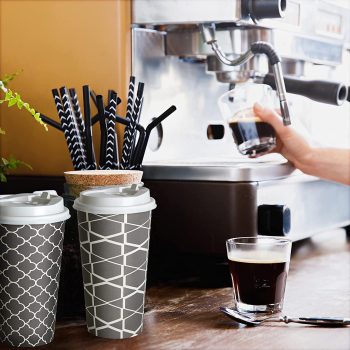Paper cups offer several eco-friendly advantages compared to their plastic or Styrofoam counterparts. Here are some of the key benefits:
- Biodegradability and Compostability: Paper cups are made from renewable resources, primarily wood pulp, which can decompose naturally over time. They can be composted along with organic waste, reducing the burden on landfills and decreasing the time it takes for them to break down.
- Reduced Greenhouse Gas Emissions: The production of paper cups generally has a lower carbon footprint compared to plastic or Styrofoam cups. The process of manufacturing paper cups involves fewer energy-intensive processes and fewer harmful emissions.
- Renewable Resource: Paper cups are made from a renewable resource – trees. Responsible forestry practices can ensure a sustainable supply of raw materials for paper production, reducing the impact on ecosystems.
- Lower Energy Consumption: The energy required to produce and recycle paper cups is typically lower than that needed for plastic or Styrofoam cups. This is particularly true if the paper cups are produced using sustainable practices and energy-efficient technologies.
- Recyclability: While not all paper cups are easily recyclable due to the wax or plastic lining that makes them suitable for holding liquids, advancements in recycling technologies are making it increasingly possible to recycle certain types of paper cups. Some recycling facilities have the capability to separate the paper from the lining and recycle them appropriately.
- Reduced Plastic Usage: By choosing paper cups over plastic cups, you reduce the demand for single-use plastics. Plastic cups take hundreds of years to break down and contribute significantly to plastic pollution, harming marine life and ecosystems.
- Support for Sustainable Practices: The demand for eco-friendly products like paper cups encourages manufacturers and suppliers to adopt more sustainable practices. This can lead to innovations in materials, production processes, and waste management.
- Consumer Perception and Behavior: Using paper cups sends a positive message to consumers that a business or individual is environmentally conscious and committed to reducing their impact on the environment. This can influence consumer choices and encourage more sustainable behavior.
However, it’s important to note that not all paper cups are created equal. Some factors that affect the overall environmental impact include the sourcing of raw materials, the manufacturing process, the distance traveled to distribution points, and end-of-life disposal methods. To maximize the eco-friendliness of paper cups, it’s important to opt for those that are certified by recognized sustainability standards and to promote proper waste management practices, such as composting and responsible recycling





























